October 22, 2018 •
Special Sessions Scheduled for U.S. Virgin Islands
Lawmakers scheduled a special session for Wednesday, October 24. The special session is regarding an initiative seeking to split the territory into five districts on the November ballot. The Legislature must either accept, reject, or propose an alternative by October […]
 Lawmakers scheduled a special session for Wednesday, October 24. The special session is regarding an initiative seeking to split the territory into five districts on the November ballot.
Lawmakers scheduled a special session for Wednesday, October 24. The special session is regarding an initiative seeking to split the territory into five districts on the November ballot.
The Legislature must either accept, reject, or propose an alternative by October 31 for the measure to be included in the general election or a special election must be held within 90 days.
Gov. Kenneth Mapp also called a special session for Friday, October 26 to consider a proposal for free college tuition.
The proposal would provide $3 million from the Internal Revenue Matching Fund and pay tuition for students at the University of the Virgin Islands starting the fall of 2019.
October 19, 2018 •
News You Can Use – October 19, 2018
National: First Came a Flood of Ballot Measures from Voters. Then Politicians Pushed Back. WRAL – Timothy Mitchell (New York Times) | Published: 10/15/2018 Over the past two years, governors and state Legislatures around the nation have used […]

National:
First Came a Flood of Ballot Measures from Voters. Then Politicians Pushed Back.
WRAL – Timothy Mitchell (New York Times) | Published: 10/15/2018
Over the past two years, governors and state Legislatures around the nation have used an array of tools to overturn, delay, diminish, or pre-emptively declare unconstitutional a variety of initiatives approved by the same voters who put them in office. Those moves follow a rise in efforts by residents to enact their own legislation, in a growing battle over who will make laws – legislators or voters. In 2016, 71 initiatives were brought forward by voters; 46 were approved, and Legislatures changed or sought to alter nearly one-quarter of those. In decades past, no one tracked the number of ballot initiatives that were overturned by politicians, but experts say they have noted a significant increase lately.
Federal:
Dark-Money Groups Were Ordered to Reveal Their Donors. They Didn’t.
Politico – Maggie Severns | Published: 10/16/2018
A disclosure deadline passed with few political nonprofits unveiling any donors, even after a court threw out a regulation that let the groups keep their funding sources private, and after the FEC told the organizations to reveal anyone who gave money after the ruling at the end of September. The Campaign Legal Center tracked 18 political nonprofits that spent money on the midterm elections between the court ruling and the end of September and could thus have donations to list. It found 14 of those groups disclosed no information with the FEC. “Many groups are likely anticipating that the FEC isn’t going to second-guess their assertion that they received no reportable contributions,” said Brendan Fischer of the Campaign Legal Center.
From the States and Municipalities:
Alaska: Alaska Law Says Lobbyists Can’t Fundraise for Candidates. But the Invitations Keep Coming
Alaska Public Media – Nathaniel Hertz | Published: 10/11/2018
In the past year, lobbyists Ashley Reed and Jerry Mackie have emailed clients and friends invitations to political fundraisers for candidates including Alaska Gov. Bill Walker and House Speaker Bryce Edgmon. That is in spite of a state law that bars lobbyists from helping with legislative and gubernatorial candidates’ fundraising efforts. Penalties for violations include a fine capped at $1,000 and up to a year in prison. Both lobbyists said they received permission to send the invitations from the Alaska Public Officers Commission. But the commission’s director, Heather Hebdon, said one of her employees had only issued non-binding, informal advice that would not protect lobbyists against a complaint.
California: An L.A. Councilman Held an $800-Per-Person Fundraiser. The Next Day, He Announced He Was Stepping Down
Los Angeles Times – Emily Alpert Reyes and David Zahniser | Published: 10/15/2018
When Los Angeles City Councilperson Mitchell Englander announced he would soon step down to join a sports and entertainment firm, the news surprised many in City Hall. His decision was especially surprising to some who had shown up to a fundraiser advertised at $800 per person that Englander staged the night before. Englander used the event to raise money for his officeholder account, a fund that city politicians use to pay for food, travel, office supplies, or other expenses tied to their official duties. Englander’s handling of the episode was considered brazen even among some City Hall veterans familiar with political fundraising.
Florida: Wealthy Candidate Set Up a Blind Trust That Wasn’t Blind
WRAL – Kevin Sack and Patricia Mazzei (New York Times) | Published: 10/17/2018
To shield himself from future conflict-of-interest charges, Florida Gov. Rick Scott, who is now running to unseat incumbent U.S. Sen. Bill Nelson, created a $73.8 million investment account that he called a blind trust. But an examination of Scott’s finances shows his trust has been blind in name only. There have been numerous ways for him to have knowledge about his holdings. Among other things, he transferred many assets to his wife and neither “blinded” nor disclosed them. And their investments have included corporations, partnerships, and funds that stood to benefit from his administration’s actions. Scott’s case demonstrates the political complexities of campaigning while wealthy, a hallmark of the age of the first billionaire president.
Georgia: Showdown in Georgia Governor’s Race Reflects a Larger Fight Over Voting Rights
WRAL – Astead Herndon and Trip Gabriel (New York Times) | Published: 10/15/2018
Secretary of State Brian Kemp, who is also the Republican candidate for governor, is in charge of elections and voter registration in Georgia. His Democratic opponent, former state Rep. Stacey Abrams, and voting rights advocacy groups charge Kemp is systematically using his office to suppress votes and tilt the election, and his policies disproportionately affect black and minority voters. The uproar over voting seems almost an inevitable development in the race, which pits two candidates on opposite sides of the nation’s voting wars who have battled with one another over access to the polls for years.
Maryland: Baltimore City Council Tightens Restrictions on Lobbyists, Require Forms Go Online
Baltimore Sun – Luke Broadwater | Published: 10/15/2018
The Baltimore City Council passed legislation that would tighten restrictions on lobbyists and require the ethics board to post lobbying disclosure forms online. Under the bill, lobbyists approaching city government would have officials to “affirmatively identify” their clients; disclosure reports would be filed twice a year, rather than annually; and there would be a possible three-year ban for any lobbyist who violates the law.
Michigan: ‘Lobbyists and Lansing Are Almost Synonymous’: How the city is shaped by advocacy sector
Lansing State Journal – Carol Thompson | Published: 10/18/2018
The advocacy industry – including the communications agencies and lobbyists they employ – is a unique one in Lansing, helping to shape the economy and culture of the city that serves as the state capital. It is also a growing sector of the state’s economy. The number of lobbyists has steadily increased since the 1990s. In 1998 there were 2,202 lobbyists and lobbyist agencies registered in Michigan; in 2017, there were 2,954. “We are kind of like motor oil,” said Taylor Benavente of the Michigan Society of Association Executives. “We’re behind the scenes, keeping the engine running.”
New Mexico: Long Road Brings NM Ethics Commission Proposal to Ballot
Albuquerque Journal – Dan Boyd | Published: 10/13/2018
After more than a decade of debate and disagreement, New Mexico lawmakers finally approved the framework of an independent ethics commission during the 2017 legislative session. Now, it will be up to voters to decide in November whether to put the commission in the state constitution. Even if voters approve the measure in November, and there is no organized opposition against it, there will still be key structural decisions to be made. For instance, the proposed constitutional amendment does not stipulate exactly when complaints would be made public and does not provide for a funding mechanism to pay for the commission’s operations.
New York: New York Attorney General Expands Inquiry into Net Neutrality Comments
WRAL – Nicholas Confessore (New York Times) | Published: 10/16/2018
New York Attorney General Barbara Underwood subpoenaed more than a dozen telecommunications trade groups, lobbying contractors, and advocacy organizations as part of the state’s investigation into widespread fake public comments submitted to the Federal Communications Commission (FCC) over net neutrality. The FCC received a record 22 million comments ahead of its decision to repeal the rules requiring internet service providers to treat all web traffic equally. Millions of comments were provided using temporary or duplicate email addresses, while others recycled identical phrases. Seven popular comments, repeated verbatim, accounted for millions more.
North Dakota: Ethics Policy Finalized for North Dakota Governor’s Office
Bismarck Tribune – Jack Dura | Published: 10/17/2018
North Dakota Gov. Doug Burgum finalized an ethics policy, months after the he reimbursed about $40,000 to Xcel Energy for events related to a Super Bowl invitation to Minneapolis. The policy applies to the governor, lieutenant governor, and all employees of the governor’s office. Its language addresses conflicts-of-interest, gifts, expenses, and political activities, among other items.
South Carolina: Will SC Lawmakers Close Loopholes Exposed by State House Corruption Probe?
The State – Maayan Schecter | Published: 10/11/2018
South Carolina legislators and Gov. Henry McMaster said they want to see the state toughen its ethics laws in the wake of a grand jury report into corruption at the statehouse. Grand jurors called for a number of reforms in the report, including eliminating “dark money” and defining the difference between lobbyists and consultants. The corruption probe report details how political consultant Richard Quinn used his consulting business and legislative network, which included his son, disgraced Rep. Rick Quinn to defeat or pass legislation on behalf of his corporate and institutional clients, in what special prosecutor David Pascoe described as “pay-for-influence schemes.”
South Dakota: Free Speech Group Can Publish Ballot Information Ahead of Election, Federal Judge Rules
Sioux Falls Argus Leader – Danielle Ferguson | Published: 10/17/2018
A free speech group suing South Dakota over its campaign finance laws can distribute educational materials about two upcoming ballot issues ahead of the November election, a federal judge ruled. The Institute for Free Speech will be able to distribute an analysis on two ballot issues without fear of the state seeking prosecution for violating a law regulating independent communication expenditure in political campaigns. The institute has asked a federal judge to declare a South Dakota campaign finance law unconstitutional, saying the law regulating independent communication expenditures is vague and a violation of First Amendment rights. The court did not declare the law unconstitutional but granted a preliminary injunction to prevent the state from prosecuting the group for posting the analysis.
Virginia: In Virginia House Race, Anonymous Attack Ads Pop Up on Facebook
WRAL – Kevin Roose (New York Times) | Published: 10/17/2018
A competitive race in Virginia’s 10th Congressional District has a new element: anonymous attack ads on Facebook. The ads were purchased by a critic of Jennifer Wexton, a Democrat trying to unseat U.S. Rep. Barbara Comstock. They attack Wexton with language and imagery not typically found in even the roughest campaigns. Since 2016, when Facebook ads were used to spread disinformation and Russian propaganda ahead of the presidential election, the social network has clamped down on political advertisers. But the owner of “Wacky Wexton Not” was able to remain anonymous by taking advantage of a loophole in Facebook’s policy.
West Virginia: W.Va. Supreme Court Justice Loughry Guilty on 11 Counts, Not Guilty on 10 Counts; Jury Hangs on 1 Count
West Virginia MetroNews – Brian McElhinny | Published: 10/12/2018
A jury convicted suspended West Virginia Supreme Court Justice Allen Loughry on 11 of the 22 charges he faced at his trial. The House impeached him and three other justices over questions involving lavish office renovations that evolved into accusations of corruption, incompetence, and neglect of duty. Loughry still faces an impeachment trial. Jurors convicted Loughry on seven wire fraud counts, which related to his use of state vehicles and credit cards for travel during weekends and holidays. One of the two convictions for making false statements showed he lied to investigators about using the vehicles and credit cards for personal business. The jury found Loughry attempted to make Kim Ellis, director of administrative services for the court, misremember conversations they had about the cost of renovations to his Supreme Court office.
October 16, 2018 •
Anne Arundel County Passes Public Ethics Bill
On October 15,2018, the Anne Arundel County Council passed a public ethics bill originally proposed by County Executive Steve Schuh. Bill No. 80-18 increases late filing fees for lobbyists and employees, adds a revolving door provision, modifies certain definitions, requires […]
 On October 15,2018, the Anne Arundel County Council passed a public ethics bill originally proposed by County Executive Steve Schuh.
On October 15,2018, the Anne Arundel County Council passed a public ethics bill originally proposed by County Executive Steve Schuh.
Bill No. 80-18 increases late filing fees for lobbyists and employees, adds a revolving door provision, modifies certain definitions, requires employee ethics training, and creates changes to comply with state ethics laws, among other provisions. The bill also updates who is required to file financial disclosure statements.
The bill will become effective 45 days from the signature of the County Executive.
October 16, 2018 •
Ad Time Reservations Qualify as Expenditures
On October 9, the Alaska Public Offices Commission (APOC) ruled that two independent expenditure groups violated state campaign finance laws. The groups, Republican Governors Association and Families for Alaska’s Future – Dunleavy, reserved ad time to influence the gubernatorial election […]
 On October 9, the Alaska Public Offices Commission (APOC) ruled that two independent expenditure groups violated state campaign finance laws.
On October 9, the Alaska Public Offices Commission (APOC) ruled that two independent expenditure groups violated state campaign finance laws.
The groups, Republican Governors Association and Families for Alaska’s Future – Dunleavy, reserved ad time to influence the gubernatorial election without registering as independent expenditure groups.
APOC determined the reservation of ad time is a promise or agreement to transfer value between parties. Therefore, the reservation qualifies as an expenditure under state law.
October 16, 2018 •
Pennsylvania State Representative Passes Away
State Rep. Mike O’Brien passed away on October 15 from a heart attack. Earlier this year, O’Brien controversially announced his retirement after running unopposed in the primary election for the 175th House District seat. The seat will remain vacant for […]
 State Rep. Mike O’Brien passed away on October 15 from a heart attack.
State Rep. Mike O’Brien passed away on October 15 from a heart attack.
Earlier this year, O’Brien controversially announced his retirement after running unopposed in the primary election for the 175th House District seat.
The seat will remain vacant for the remainder of the year due to time constraints.
His former chief of staff, Mary Isaacson, is likely to be sworn in on January 1.
October 12, 2018 •
National Group Files Lawsuit Regarding Two South Dakota Ballot Issues
The Institute for Free Speech is challenging the constitutionality of a South Dakota law restricting the organization’s right to publicize views of ballot measures without extensive reporting and disclaimer requirements. The organization is asking for permission from a federal judge […]
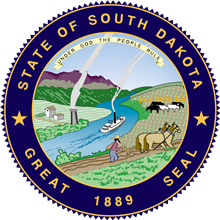 The Institute for Free Speech is challenging the constitutionality of a South Dakota law restricting the organization’s right to publicize views of ballot measures without extensive reporting and disclaimer requirements.
The Institute for Free Speech is challenging the constitutionality of a South Dakota law restricting the organization’s right to publicize views of ballot measures without extensive reporting and disclaimer requirements.
The organization is asking for permission from a federal judge to distribute an analysis of Initiated Measure 24 and Constitutional Amendment W, claiming that the measures will impact citizens’ First Amendment rights.
October 12, 2018 •
News You Can Use – October 12, 2018
National: Out-of-State Donors Pour Cash into Democrats’ State Races Center for Public Integrity – Rui Kaneya and Joe Yerardi | Published: 10/10/2018 Nationwide, many Democrats running for state-level offices from governor to state representative are also collecting a significant amount […]

National:
Out-of-State Donors Pour Cash into Democrats’ State Races
Center for Public Integrity – Rui Kaneya and Joe Yerardi | Published: 10/10/2018
Nationwide, many Democrats running for state-level offices from governor to state representative are also collecting a significant amount of money from across state lines. Though Democrats still trail Republicans in the overall fundraising tally, they have so far raised at least $101 million from out of state, about $29 million more than their GOP counterparts have taken in. The influx of out-of-state contributions comes from a mix of companies with local interests, networks of contacts scattered across the country, and newly emboldened national groups that are mobilizing to influence state-level elections, mindful that the outcomes will have an impact on politics at the state and national levels lasting well into the next decade.
Federal:
FEC Guidance to Limit Impact of Dark Money Court Ruling
Associated Press – Brian Slodysko | Published: 10/5/2018
The FEC issued new guidance in response to a U.S. District Court ruling that found the agency improperly allowed “social welfare” nonprofits to skirt disclosure requirements for some donors. While the guidance answers some questions, it raises others. “A lot of people were very excited when [the case] first came out, but when you get into the weeds, one has to acknowledge that the opinion is not as broad some people had hoped,” said FEC Commissioner Ellen Weintraub.
Saluting the Trump Administration, Not So Nicely
Politico – Ben Schreckinger | Published: 10/9/2018
At the White House, the nearby Trump International Hotel, and wherever the presidential motorcade goes, Washingtonians are greeting Donald Trump’s presidency with an extended middle finger. As episodes like the separation of migrant families and the confirmation of Brett Kavanaugh to the Supreme Court continue to inflame passions in Washington, D.C., these one-fingered salutes have become a pervasive marker of an administration under siege in its own city. Tourists posing for photographs, passengers in the cars that drive by the White House, and pedestrians caught unaware by motorcades have all made increasing use of the vulgar gesture since Trump came to town. Some do it subtly; others make a show of it.
Wall Street Is Booming Under Trump. But Many of Its Donors Are Embracing Democrats.
WRAL – Shane Goldmacher (New York Times) | Published: 10/7/2018
The stock market is booming, unemployment is hitting record lows, and Republicans pushed through $1.5 trillion in tax cuts. But despite all that, for the first time in a decade, the broader financial community is on pace to give more money to Democratic congressional candidates and incumbents than their GOP counterparts. Some of the same grassroots energy coursing through the Democratic Party, House candidates from Kentucky to Montana to New York are reporting record sums of small donations, has spilled into the corporate boardrooms of American finance, even amid increasingly hostile rhetoric from Democrats in Washington and on the campaign trail toward Wall Street.
From the States and Municipalities:
California: Are Political Swamps in California and Washington Mostly Drained? This Study Says They Are.
Sacramento Bee – Andrew Sheeler | Published: 10/9/2018
California ranks second in the nation for anti-corruption laws, according to a new report from the Coalition for Integrity. California share second-place Rhode Island; both states fell behind Washington state, which claimed the best score in the 2018 States With Anti-Corruption Measures for Public Officials (S.W.A.M.P.) Index. The index looks at eight metrics when assigning a score to a state, including whether there is an ethics agency with subpoena and sanction power, and whether elected and appointed executive branch officials are prohibited from accepting expensive gifts from lobbyists. At the other end of the spectrum, the S.W.A.M.P. Index rated North Dakota as worst in the nation for ethics and transparency laws.
Colorado: Wall Street Pumping Cash Through Loophole in Anti-Corruption Rule
Capital & Main – David Sirota and Chase Woodruff | Published: 10/4/2018
If Wall Street executive look to land a lucrative contract to manage Colorado retirees’ pension money, a federal “pay-to-play” rule is designed to deter them from trying to use campaign donations to influence state officials who oversee those investment decisions. Despite that regulation, however, state Treasurer Walker Stapleton’s gubernatorial campaign is being boosted by a political group partially sponsored by financial firms that receive investments from the pension fund Stapleton helps run. If Stapleton is elected governor, he will leave the pension fund’s board but will appoint three members of the board, potentially giving him even more influence over which financial firms get pension investments.
Indiana: Former Intern Says Brian Bosma Tried to Intimidate Her Over Alleged Sexual Encounter
Indianapolis Star – Tony Cook, Kaitlin Lange, and Ryan Martin | Published: 10/10/2018
Indiana House Speaker Brian Bosma investigated groping allegations against the state attorney general and is crafting a first-ever sexual harassment policy for legislators. He is also the same man who aggressively investigated the credibility of a former statehouse intern who said she had a sexual encounter with him decades ago. Family members of the woman claim Bosma’s attorney threatened to reveal the unfavorable information about her if her account became public and to expose her name even if news organizations withheld it. The former intern, Kandy Green, did not accuse Bosma of a crime. Bosma denies the encounter took place.
Kentucky: Amy McGrath Is Avoiding Attack Ads. Can a Congressional Candidate Win Without Them?
WRAL – Michael Tackett (New York Times) | Published: 10/10/2018
The race for Kentucky’s Sixth Congressional District between U.S. Rep. Andy Barr and his Democratic challenger, Amy McGrath, has featured one of the highest concentrations of political ads in the country, almost 7,000 airings, in one of the most fiercely fought races. The contest also has one of the most lopsided ratios of negative-to-positive ads, with Barr and aligned Republican groups spending overwhelmingly on spots attacking his opponent. McGrath, so far, has not run attack ads, an approach that makes this contest a laboratory to test the proposition that while voters find negative ads distasteful, candidates use them because they work.
Missouri: Missouri Lobbying Rules Fought in Federal Court
Courthouse News Service – Joe Harris | Published: 10/8/2018
The Institute for Justice filed a lawsuit claiming an executive order that bans all gifts, including written materials, to certain government officials in Missouri violates its constitutional rights. At issue is Missouri Executive Order 17-02 which prohibits “anything of value” to be given to a member of the state’s executive branch by a lobbyist. The Institute for Justice claims that by prohibiting the distribution of two of its publications, “Bottleneckers: Gaming the Government for Power and Private Profit” and “License to Work 2,” to government employees, the executive order violates its First Amendment right to free speech and Fourteenth Amendment right to petition the government for redress of grievances.
New Mexico: New Mexico Legislators Eat, Lobbyists Treat, but Public Left Guessing Who
Santa Fe New Mexican – Andrew Oxford | Published: 10/8/2018
Because of a loophole in New Mexico law, lobbyists for the most part do not have to disclose which officials they have been attempting to influence. Although the latest round of filings by lobbyists points to tens of thousands of dollars spent on entertaining policymakers, the representatives of companies and special interests remain largely free to conceal the issues they are advocating for and the policymakers they are trying to sway. The Legislature has shown little appetite for requiring more disclosure from lobbyists.
Ohio: Workers Allege Campaign Donations Were Expected, Rewarded by Summit Prosecutor Sherri Bevan Walsh
WKYC – Phil Trexler and Tom Meyer | Published: 10/10/2018
Summit County Prosecutor Sherri Bevan Walsh is accused of ignoring acts of bullying, sexual harassment, and racial discrimination in her office, while allowing political campaigning to take place by favored workers, sometimes on county time, and requiring campaign donations of her workers and denying pay hikes to those who did not. Walsh’s campaign finance reports reflect the cash flow, showing her employees contributed thousands of dollars, or about half of her entire campaign funds, in the past six filing periods. Five employees have filed complaints alleging mistreatment.
Oklahoma: Attorneys Help Bankroll Campaigns of Judges Who Hear Their Cases
Oklahoma Watch – Taylor Brown | Published: 10/8/2018
Judges in Oklahoma rarely recuse themselves voluntarily or on request because they received money from attorneys arguing before them. That is despite the fact that attorneys represent the largest number of donors to district judges’ campaigns. Court filings show many of those attorneys frequently have appeared before the candidates to whom they gave money; some donated to judges while the judge was still presiding over their case. No evidence has emerged that donations from lawyers gained them or their firms more favorable rulings or treatment from judges. But campaign finance reform advocates, along with some Oklahoma judicial candidates, say the state’s system of electing district judges poses a risk to the integrity of the system.
South Carolina: SC Attorney General Tried to Impede Statehouse Corruption Probe, Grand Jury Says
Charleston Post and Courier – Glenn Smith and Thad Moore | Published: 10/9/2018
South Carolina Attorney General Alan Wilson’s inaction impeded a probe into statehouse corruption, according to a grand jury report. Wilson’s conduct after former House Speaker Bobby Harrell pleaded guilty and named two other lawmakers cost investigators 13 months and meant the statute of limitations on potential federal crimes like money laundering ran out, the grand jurors said. The report notes Wilson’s close relationship with political consultant Richard Quinn. The corruption inquiry focused mainly on Quinn’s consulting business, his clients, and whether he acted like a lobbyist without registering. The report gives a behind the curtain look at the blurry line between political consultants, lobbyists, and powerful businesses in the state.
Tennessee: Taylor Swift’s Stunning Statement: Famously apolitical star slams Tennessee Republican, endorses Democrats
Washington Post – Emily Yahr | Published: 10/7/2018
Taylor Swift, the pop music star who has been notably apolitical in turbulent political times, endorsed two Democratic candidates running for election in Tennessee. In a post on Instagram, Swift said she planned to vote for Phil Bredesen, who is competing in a close U.S. Senate race against a Republican candidate backed by President Trump, and U.S. Rep. Jim Cooper, an incumbent who represents the Nashville area. Swift’s political views had previously been left up to interpretation, and at times her silence was viewed as support for Trump as well as the alt-right movement.
West Virginia: As 1 Supreme Court Justice Survives Impeachment in West Virginia, Others Face Trial
Governing – Phil Kabler (Charleston Gazette) | Published: 10/3/2018
One West Virginia Supreme Court justice has survived an impeachment scare. Beth Walker will remain in office after state senators rejected an impeachment article against her after a two-day trial. Senators later adopted a resolution by voice vote to issue a public reprimand of Walker. She was accused of abusing her authority. The impeachment charge stated Walker and other justices failed to control office expenses and maintain policies over matters such as working lunches and the use of state vehicles and office computers at home.
October 11, 2018 •
Utah to Hold Special Session Following November Elections
Last week, Gov. Gary Herbert promised to call a special session of the legislature to address medical marijuana after the November election. In the election, Utah will vote on Proposition 2, an initiative to allow patients with certain medical conditions […]
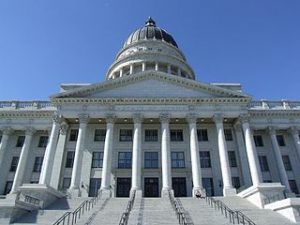 Last week, Gov. Gary Herbert promised to call a special session of the legislature to address medical marijuana after the November election.
Last week, Gov. Gary Herbert promised to call a special session of the legislature to address medical marijuana after the November election.
In the election, Utah will vote on Proposition 2, an initiative to allow patients with certain medical conditions to purchase medical marijuana.
No matter what voters decide in November, Utah lawmakers have proposed and agreed on an alternate medical marijuana plan.
No date for the session has been announced.
October 11, 2018 •
Missouri Gift Ban Extends to Written Materials
A public interest law firm challenged an executive order banning lobbyists from giving anything of value, including written materials, to executive branch officials. The Institute for Justice, a Virginia-based nonprofit libertarian law firm, filed suit against Gov. Mike Parson and […]
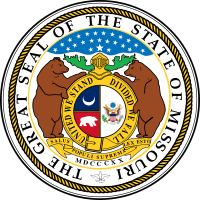 A public interest law firm challenged an executive order banning lobbyists from giving anything of value, including written materials, to executive branch officials.
A public interest law firm challenged an executive order banning lobbyists from giving anything of value, including written materials, to executive branch officials.
The Institute for Justice, a Virginia-based nonprofit libertarian law firm, filed suit against Gov. Mike Parson and members of the Missouri Ethics Commission for enforcing Executive Order 17-02, which expands the definition of gift to include publications addressing public policy issues.
The Institute for Justice claims that by prohibiting the distribution of two of its public policy publications to government officials, the executive order violates the law firm’s First Amendment right to free speech. The law firm also claims the executive order violates its right to equal protection by prohibiting only lobbyists from sharing publications with state officials of the executive branch.
The order was issued on January, 9, 2017, by former Gov. Eric Greitens.
On October 4, 2018, the Anchorage Superior Court heard witnesses in the formal appeal of an Alaska Public Office Commission (APOC) decision allowing unlimited contributions to independent expenditure groups. Several citizens, represented by the nonprofit group Equal Citizens, claim the […]
 On October 4, 2018, the Anchorage Superior Court heard witnesses in the formal appeal of an Alaska Public Office Commission (APOC) decision allowing unlimited contributions to independent expenditure groups.
On October 4, 2018, the Anchorage Superior Court heard witnesses in the formal appeal of an Alaska Public Office Commission (APOC) decision allowing unlimited contributions to independent expenditure groups.
Several citizens, represented by the nonprofit group Equal Citizens, claim the contributions are pursuant to a 2006 Alaska State law.
APOC relied on the application of Citizens United when it rejected the original claim.
October 9, 2018 •
North Carolina Proposed Constitutional Amendment Concerns Board of Elections and Ethics Enforcement
North Carolina will vote on a constitutional amendment to establish an eight-member Bipartisan Board of Elections and Ethics Enforcement in November. A 2017 law establishing an eight-member board was struck down by the North Carolina Supreme Court because it reduced […]
 North Carolina will vote on a constitutional amendment to establish an eight-member Bipartisan Board of Elections and Ethics Enforcement in November.
North Carolina will vote on a constitutional amendment to establish an eight-member Bipartisan Board of Elections and Ethics Enforcement in November.
A 2017 law establishing an eight-member board was struck down by the North Carolina Supreme Court because it reduced the governor’s executive authority and failed to provide representation for unaffiliated voters.
If the amendment passes, majority and minority leaders of the legislature would nominate potential members from which the governor would choose.
October 8, 2018 •
FEC Issues Reporting Guidance Following CREW v FEC
On October 4, the Federal Election Commission (FEC) issued new guidance on the reporting of political contributions made to nonprofit organizations making certain independent expenditures. The guidance, released in an FEC press release, was issued in reaction to a federal […]
 On October 4, the Federal Election Commission (FEC) issued new guidance on the reporting of political contributions made to nonprofit organizations making certain independent expenditures.
On October 4, the Federal Election Commission (FEC) issued new guidance on the reporting of political contributions made to nonprofit organizations making certain independent expenditures.
The guidance, released in an FEC press release, was issued in reaction to a federal court’s decision in CREW v FEC, which ruled a campaign finance disclosure regulation followed for decades by the FEC failed to uphold disclosure requirements required by a federal statute.
Chief Judge Beryl A. Howell of the United States District Court for The District of Columbia found the FEC regulation 11 CFR §109.10(e)(1)(vi), did not comport with the statutory disclosure requirements of 52 U.S.C. §30104(c).
The district court found the regulation impermissibly narrowed the mandated disclosure in 52 U.S.C. §30104(c)(2)(C), which requires the identification of donors contributing for the purpose of furthering the non-political committee’s own express advocacy for or against the election of a federal candidate, even when the donor has not expressly directed the funds be used in the precise manner reported.
October 8, 2018 •
VA Lawmakers Cancel Redistricting Session
Lawmakers in the Virginia House of Delegates have canceled a redistricting session scheduled for October 21. Gov. Ralph Northam has previously stated his intentions to veto the current redistricting proposal, House Bill 7003, if the bill reaches his desk. Without […]
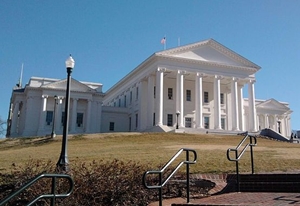 Lawmakers in the Virginia House of Delegates have canceled a redistricting session scheduled for October 21.
Lawmakers in the Virginia House of Delegates have canceled a redistricting session scheduled for October 21.
Gov. Ralph Northam has previously stated his intentions to veto the current redistricting proposal, House Bill 7003, if the bill reaches his desk.
Without a legislative solution, the redistricting of House districts will be handled by a court appointed independent party.
October 8, 2018 •
Ohio State Representative Resigns
Two-term Democratic state Rep. Martin Sweeney resigned from the House on Monday, October 1, with more than two months remaining on his term. In his resignation letter, Sweeney referred to the next chapter of his professional career but did not […]
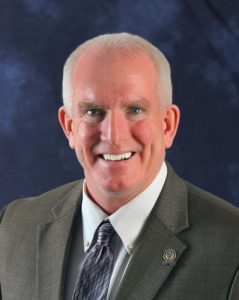 Two-term Democratic state Rep. Martin Sweeney resigned from the House on Monday, October 1, with more than two months remaining on his term.
Two-term Democratic state Rep. Martin Sweeney resigned from the House on Monday, October 1, with more than two months remaining on his term.
In his resignation letter, Sweeney referred to the next chapter of his professional career but did not state his plans.
Sweeney’s daughter Bride Rose is running to fill the seat. Rose will face Libertarian Ryan McClain in the November election.
Sweeney came to the House after serving as Cleveland City Council president.
State and Federal Communications, Inc. provides research and consulting services for government relations professionals on lobbying laws, procurement lobbying laws, political contribution laws in the United States and Canada. Learn more by visiting stateandfed.com.

